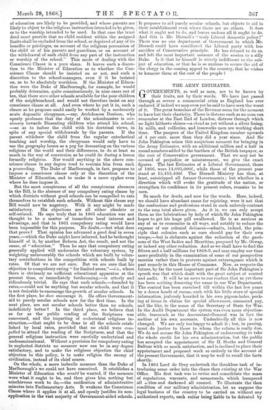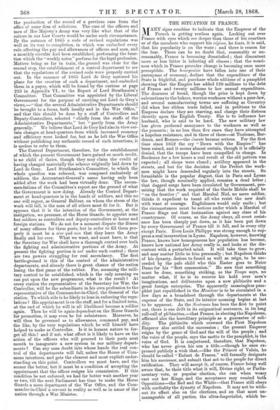THE ARMY ESTIMATES.
GOVERNMENTS, as well as men, are to be known by their fruits, not by their words. We have just passed through as severe a commercial crisis as England has ever endured, if indeed we may even yet be said to have seen the worst of it. The great branches of the Revenue seem for the moment to have lost their elasticity. There is distress such as no man can remember at the East End of London, distress through which no light hitherto shines—a cloud as yet without a silver lining. In mills, and collieries, and ironworks men are working short time. The paupers of the United Kingdom number upwards of 4 per cent. more than they did a year since. And Sir John Pakington seizes this auspicious moment for bringing in the Army Estimates, with an additional million and a half in round numbers added to the burthen of the British taxpayer, as the cost of Conservative government. That we may not be accused of prejudice or misstatement, we give the exact figures. The last Estimates of a Liberal Government, those of 1866, were 14,095,0001., while those of the present year stand at 15,455,4001. The Disraeli Ministry has thus, at least, outstripped all former Governments ; but whether in a direction which will evoke the gratitude of the nation, or strengthen its confidence in its present rulers, remains to be seen.
So much for deeds, and now for the words. Here, indeed, we should have abundant cause for rejoicing, were it not that the confessions and professions stand in such unlovely contrast to the sum total above given. As it is, we can only accept them as the lubrications by help of which Sir John Pakington hopes to get his huge pill swallowed. He is as anxious as any of us to economize in all ways, and notably to reduce the expense of our colonial defences—admits, indeed, the prin- ciple that colonies such as ours should pay for their own troops,—but is obdurate against the reduction of the garri- sons of the West Indies and Mauritius, proposed by Mr. Otway, or indeed any other reduction. And so we shall have to find the fifteen and a half millions for 1868-9, and may employ our time more profitably in the examination of some of our prospective mercies rather than in protests against extravagance which is past remedy in this House of Commons. Now, as respects the future, by far the most important part of Sir John Pakington's speech was that which dealt with the great subject of control and audit. It will be no news to our readers that as yet there has been nothing deserving the name in our War Department. The control has been exercised till within the last few years by a dozen heads of rooms, each with his little store of special information, jealously hoarded in his own pigeon-holes, peck- ing at items in claims for special allowances, command pay, and the like, in the name of the Secretary of State for War. In the Audit Department the system was even more objection- able, inasmuch as the Accountant-General was in fact the auditor of his own accounts. Undoubtedly all this is now changed. We are only too happy to admit it ; but, in passing, must do justice to those to whom the reform is really due. We do not accuse Sir John Pakington of endeavouring to take the whole credit for his own administration, but the public has accepted the appointment of Sir H. Storks and General Balfour with so much satisfaction, and is inclined to place their appointment and proposed work so entirely to the account of the present Government, that it may be well to recall the facts shortly.
In 1864 Lord de Grey undertook the thankless task of in- troducing some order into the chaos then existing at the War Office. His first task was to revise and consolidate the mass of regulations, warrants, and memoranda, which hampered
all 1.-ztion and darkened all counsel. To illustrate the then condition of our military administration, let us suppose the legal business of the country to be carried on without any authorized reports, each suitor being liable to be defeated by
the production of the record of a previous case from the office of some firm of solicitors. The case of the officers and men of Her Majesty's Army was very like what that of the suitors in our Law Courts would be under such circumstances.
By the autumn of 1865 a code of revised regulations was well on its way to completion, in which was embodied every rule affecting the pay and allowances of officers and men, and a monthly circular had been established, performing the func- tion which the "weekly notes" perform for the legal profession. Matters being so far in train, the ground was clear for the second step, the establishment of a control department to see that the regulations of the revised code were properly carried out. In the summer of 1865 Lord de Grey matured his plans for the creation of such a department, and embodied them in a paper, which will be found by the curious at page 233 in Appendix VI., to the Report of Lord Strathnairn's Committee. That Committee was appointed by the Liberal Government for the purpose of carrying out Lord de Grey's views,—" that the several Administrative Departments should be brought to a focus, both locally and in the War Office," and that this should be done by a staff of Controllers and Deputy-Controllers, selected " chiefly from the staffs of the Administrative Departments," but " partly from the Army generally." We believe that Lord de Grey had also in view cer- tain changes at head-quarters from which increased economy and efficiency were looked for, but as he left the War Office without publishing any authentic record of such intentions, it is useless to refer to them.
The Control Department, therefore, for the establishment of which the present Government have gained so much credit, is no child of theirs, though they may claim the credit of having changed materially the scheme originally laid down by Lord de Grey. Lord Strathnairn's Committee, to which the whole question was referred, was composed exclusively of soldiers, the Accountant-General's name having only been added after the work had been virtually done. The recom- mendations of the Committee's report are the ground of what the Government is now doing. Already the Control Depart- ment at head-quarters is in the hands of soldiers, and this no one will regret, as General Balfour, on whom the stress of the work will fall, is the man of all others most fit for it. But it appears that it is the intention of the Government, at the instigation, we presume, of the Horse Guards, to appoint none but soldiers as controllers and deputy-controllers at home and foreign stations. We do not for a moment dispute the fitness of many officers for these posts, but in order to fill them pro- perly it must be a sine qua non that they leave the Army finally and for ever. What we want, and must have, is that the Secretary for War shall have a thorough control over both the fighting and administrative portions of the Army. At present the fighting portion is not under such control ; there are two powers struggling for real ascendancy. The first battle-ground is this of the control of the administrative departments, and already there is great chance of the nation losing the first game of the rubber. For, assuming the mili- tary control to be established, which is the only meaning we can put upon the new programme, what is the result ? At every station the representative of the Secretary for War, the Controller, will be the subordinate in his own profession to the representative of the Commander-in-Chief, the General of the station. To which side is he likely to lean in enforcing the regu- lations ? His appointment is on the staff, and for a limited term, at the end of which he will in all likelihood become a soldier again. Then he will be again dependent on the Horse Guards for promotion, it may even be for subsistence. Moreover, he will then be governed as to allowances, command pay, and the like, by the very regulations which he will himself have helped to make as Controller. Is it in human nature to for- get all this ? and if not, what effect is it likely to have on the action of the officers who will proceed to their posts next month to inaugurate a new system in our military depart- ments ? Can any man doubt into whose hands the real con- trol of the departments will fall, unless the House of Com- mons interferes, and gets the clearest and most explicit under- standing on this point. Controllers we must have, and the sooner the better, but it must be a condition of accepting the appointment that the officer resigns his commission. If this condition be not enforced, we had far better wait another year or two, till the next Parliament has time to make the Horse Guards a mere department of the War Office, and the Com- mander-in-Chief a servant in reality as well as in name of the nation through a War Minister. .



































 Previous page
Previous page